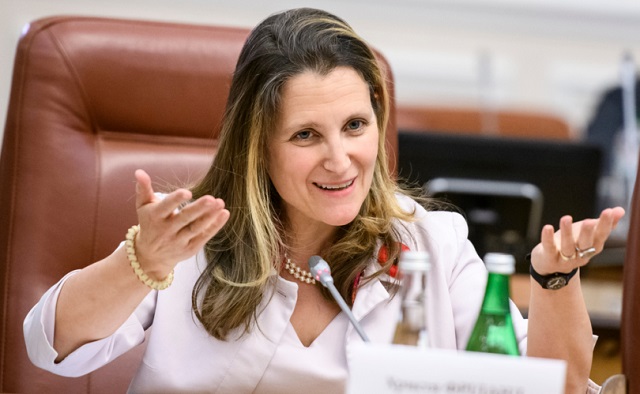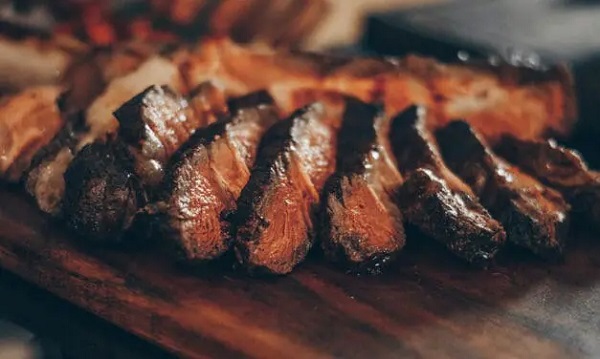Uncategorized
Chrystia Freeland refuses to answer how much Trudeau government has collected via carbon tax

From LifeSiteNews
Deputy Prime Minister and Finance Minister Chrystia Freeland continues to claim that the revenue from the carbon tax ‘goes back to Canadians’ despite data showing otherwise.
Canadian Deputy Prime Minister and Finance Minister Chrystia Freeland has refused to reveal how much Liberals have collected via the unpopular carbon tax, which is set to go up again on April 1.
During a March 21 session in the House of Commons, Conservative Member of Parliament (MP) Marty Morantz questioned Freeland regarding how much the Liberal government has taken in through the carbon tax.
“How much has your government collected in carbon taxes?” Morantz asked.
Freeland responded by dodging the question, stating, “[This is] also an opportunity for me to point out that Manitoba families will be getting $1,200 this year.”
“Again, minister, if I could just have the number [of] how much you’ve collected in carbon taxes,” Morantz pressed.
Freeland again refused to answer, instead claiming that the “key point” is that the “price on pollution” is “revenue neutral.”
As Morantz persisted in his question, Freeland alleged that the revenue from the carbon tax is “all money that goes back to Canadians.”
However, this statement has been proven untrue as the Parliamentary Budget Officer recently revealed that the government rebates are insufficient to cover the rising costs of fuel under Trudeau’s carbon tax, causing many to wonder where their money is actually going.
According to records published in December, the carbon tax cost Canadians nearly $200 million in paperwork since Prime Minister Justin Trudeau introduced the fuel charge in 2019.
Trudeau’s carbon tax, framed as a way to reduce carbon emissions, has cost Canadian households hundreds of dollars annually despite rebates when factoring in the indirect costs associated with the measure.
The costs are only expected to rise, as a recent report revealed that a carbon tax of more than $350 per tonne is needed to reach Trudeau’s net-zero goals by 2050.
Currently, Canadians living in provinces under the federal carbon pricing scheme pay $65 per tonne, but the Trudeau government has a goal of $170 per tonne by 2030.
Additionally, Trudeau has refused to pause the carbon tax hike scheduled for April 1, despite seven out of ten provincial premiers and 70 percent of Canadians pleading with him to halt his plan.
Meanwhile, Trudeau and his cabinet continue to attend lavish retreats, with a recent Liberal retreat costing taxpayers nearly $500,000.
During a media interview following the nearly $500,000 retreat, Trudeau told Canadians struggling with the high cost of living that times are also difficult for politicians.
“Yeah, people are facing tough times, and yes, everyone is finding it difficult right now. And as leaders, MPs, parliamentarians of all types, part of our job is to be there to take it, to support it as Canadians are worried and anxious, and put out those solutions,” he said.
“So yeah, it’s not an easy time to be a politician,” Trudeau lamented.
Business
Beef is becoming a luxury item in Canada

This article supplied by Troy Media.
 By Sylvain Charlebois
By Sylvain Charlebois
Canadian beef prices have surged due to a shrinking cattle herd, high transportation costs, and potential market collusion
With summer weather settling in, Canadians are returning to a familiar ritual—ring up the barbecue. But as they approach the meat counter, many are faced with shockingly high prices. This year, the meat aisle has become a case study in supply-side economics and market dysfunction, leaving
consumers to wonder how this all came to be.
Since January, according to Statistics Canada, beef prices have surged dramatically. Striploin is up 34.2 per cent, top sirloin 33.7 per cent, and rib cuts nearly 12 per cent. Pork rib cuts and chicken breasts have each risen 5.9 per cent, while even meatless burger patties are 6.8 per cent more
expensive. Beef has led the way in these increases, and its dominance in the price hikes is striking. What’s particularly concerning is that it’s not just one cut of beef—virtually every option has seen a dramatic jump, putting pressure on Canadian consumers who were already grappling with rising food costs.
The cause behind these increases lies in Canada’s shrinking beef cow inventory, now at just 3.38 million head—the lowest since 1989. This represents a 1.2 per cent drop from last year, but it signals much more than a cyclical decline. Many cattle producers, facing an increasingly volatile market, are choosing to exit the industry while prices are favourable. Others are opting to reinvest in less risky sectors or even shift entirely to crop production, leaving the beef industry in a precarious state. In short, Canada’s beef industry is retreating, and with that retreat comes rising prices, fewer available cattle, and growing uncertainty.
South of the border, the U.S. is seeing a similar trend, but far less severe. According to the United States Department of Agriculture, the
American beef cow herd declined by just 0.5 per cent to 27.9 million head. This relatively modest drop, coupled with less disruption in their production practices, has resulted in more stable prices.
Over the past year, U.S. boneless sirloin steak rose 5.7 per cent, compared to a staggering 22 per cent in Canada. Ground beef saw a 10.8 per cent increase in the U.S., but 23 per cent in Canada. The price difference between the two countries is stark, and Canadians are feeling the inflationary pressure much more acutely.
There are several factors contributing to the price hikes: Canada’s vast geography, high transportation costs, a limited number of federally licensed beef processors, carbon pricing, and higher labour costs. Carbon pricing, in particular, has added a burden to sectors like beef production, where transportation costs are high. Regulations and logistical inefficiencies add to the costs, driving up prices for retailers and, ultimately, consumers.
This combination of factors is having a compounding effect on the price of beef, making it increasingly out of reach for many.
But there’s another possibility we can’t ignore: potential collusion within the industry. In Canada, a small number of large processors control much of the beef supply, which gives them significant influence over prices. The U.S. government has taken strong action against price-fixing among major meat packers like JBS, Tyson Foods, Cargill, and National Beef, leading to multimillion-dollar settlements. In Canada, however, the Competition Bureau has remained largely silent on similar concerns, allowing the possibility of price-fixing to persist unchecked. Perhaps it’s time for Canada to follow the U.S. lead and ensure the beef industry is held accountable for its actions.
The consequences of these rising costs are already evident. According to IBISWorld, Canadian per capita beef consumption fell by 7.1 per cent in 2023 and is expected to drop another 2.1 per cent in 2024. This isn’t merely a shift in dietary preferences—this is a structural change in consumer behaviour. Beef is becoming increasingly viewed as a luxury item, with many budget-conscious households turning to ground beef as a more affordable option. For many Canadians, beef is no longer a staple food but rather an occasional indulgence, reserved for special occasions or holiday meals.
This shift is unfortunate. Beef remains one of the most natural, sustainable sources of protein available to Canadians. Ranchers and processors have made significant strides in improving environmental stewardship, animal welfare, and food safety, often without recognition. Beef is not only nutritionally dense but also supports rural economies and provides a level of traceability few other protein sources can offer.
For many Canadian families, a summer steak on the grill is becoming more of a splurge than a staple. While Canadians will continue to enjoy beef, the frequency and volume of consumption will likely diminish.
Barbecue season hasn’t disappeared, but for many, it’s starting to look a little different: more sausages, more chicken, and fewer striploins. A shame, really, for a product that offers so much more than just taste.
Dr. Sylvain Charlebois is a Canadian professor and researcher in food distribution and policy. He is senior director of the Agri-Food Analytics Lab at Dalhousie University and co-host of The Food Professor Podcast. He is frequently cited in the media for his insights on food prices, agricultural trends, and the global food supply chain.
Troy Media empowers Canadian community news outlets by providing independent, insightful analysis and commentary. Our mission is to support local media in helping Canadians stay informed and engaged by delivering reliable content that strengthens community connections and deepens understanding across the country.
Uncategorized
Poilievre on 2025 Election Interference – Carney sill hasn’t fired Liberal MP in Chinese election interference scandal

From Conservative Party Communications
“Yes. He must be disqualified. I find it incredible that Mark Carney would allow someone to run for his party that called for a Canadian citizen to be handed over to a foreign government on a bounty, a foreign government that would almost certainly execute that Canadian citizen.
“Think about that for a second. We have a Liberal MP saying that a Canadian citizen should be handed over to a foreign dictatorship to get a bounty so that that citizen could be murdered. And Mark Carney says he should stay on as a candidate. What does that say about whether Mark Carney would protect Canadians?
“Mark Carney is deeply conflicted. Just in November, he went to Beijing and secured a quarter-billion-dollar loan for his company from a state-owned Chinese bank. He’s deeply compromised, and he will never stand up for Canada against any foreign regime. It is another reason why Mr. Carney must show us all his assets, all the money he owes, all the money that his companies owe to foreign hostile regimes. And this story might not be entirely the story of the bounty, and a Liberal MP calling for a Canadian to be handed over for execution to a foreign government might not be something that the everyday Canadian can relate to because it’s so outrageous. But I ask you this, if Mark Carney would allow his Liberal MP to make a comment like this, when would he ever protect Canada or Canadians against foreign hostility?
“He has never put Canada first, and that’s why we cannot have a fourth Liberal term. After the Lost Liberal Decade, our country is a playground for foreign interference. Our economy is weaker than ever before. Our people more divided. We need a change to put Canada first with a new government that will stand up for the security and economy of our citizens and take back control of our destiny. Let’s bring it home.”
-

 conflict2 days ago
conflict2 days agoIran nuclear talks were ‘coordinated deception’ between US and Israel: report
-

 Alberta2 days ago
Alberta2 days agoPunishing Alberta Oil Production: The Divisive Effect of Policies For Carney’s “Decarbonized Oil”
-

 International2 days ago
International2 days agoIsrael’s Decapitation Strike on Iran Reverberates Across Global Flashpoints
-

 Energy2 days ago
Energy2 days agoCanada is no energy superpower
-

 Alberta2 days ago
Alberta2 days agoAlberta Premier Danielle Smith Discusses Moving Energy Forward at the Global Energy Show in Calgary
-

 Health2 days ago
Health2 days agoJust 3 Days Left to Win the Dream Home of a Lifetime!
-

 Fraser Institute2 days ago
Fraser Institute2 days agoLong waits for health care hit Canadians in their pocketbooks
-

 conflict1 day ago
conflict1 day agoOne dead, over 60 injured after Iranian missiles pierce Iron Dome



